Categories
- Anti-coagulants
- AntiGas
- Baby & Child
- Beauty & Skincare
- Brain Health
- Drinks
- Ethical
- Fragrances & Girts
- Fungal Nail Infections
- Gastro-Intestinal care
- Gatro-Intestinal Health
- Gillette
- Medicines & Treatment
- Medicines & Treatments
- Sexual Health
- Special Offer
- Stomach Ulcer
- Toiletries
- Uncategorized
- Vitamins | Supplements | Nutrition
Archives
- June 2024
- May 2024
- July 2023
- May 2022
- March 2022
- February 2022
- November 2021
- March 2021
- May 2020
- April 2020
- March 2020
- February 2020
- January 2020
- December 2019
- November 2019
- October 2019
- September 2019
- August 2019
- July 2019
- June 2019
- May 2019
- April 2019
- March 2019
- February 2019
- January 2019
- December 2018
- November 2018
- October 2018
- September 2018
- August 2018
- July 2018
- June 2018
- May 2018
- April 2018
- March 2018
- February 2018
- January 2018
- December 2017
- November 2017
- October 2017
- September 2017
- July 2017
- March 2017
‘Bold new goal’ to tackle dirty air
‘Bold new goal’ to tackle dirty air
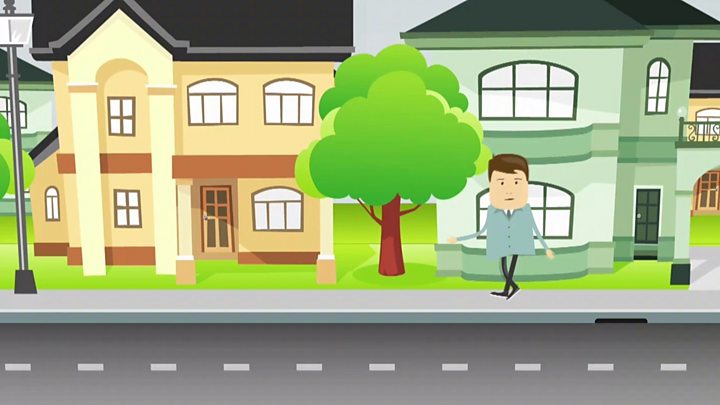
Wood burning stoves, open fires and farms all face new restrictions as the government sets out what it calls a “world leading” plan to tackle air pollution.
In their Clean Air Strategy, published today, the government promises to set a “bold new goal” to reduce particulates across much of the country by 2030.
But green groups say the scheme is vague and severely lacking in detail.
They believe the plan proposes nothing new to tackle roadside dirty air.
The new strategy, which is focussed on tackling air pollution in England, has been launched just days after the family of a nine-year-old girl who died from asthma were given permission to apply for a fresh inquest into her death.
The government’s chief lawyer heard new evidence her death could be linked to unlawful levels of air pollution.
- Air pollution early deaths rise in EU
- Reality Check: Do clean air zones work?
- Even low air pollution may damage heart
The human cost of air pollution
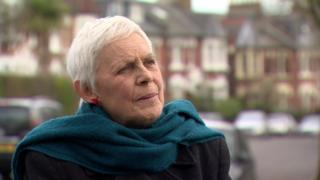
Catherine Bazell is a retired London librarian who suffers from asthma and a condition called bronchiectasis.
It’s a long-term illness where the airways of the lungs become abnormally widened, leading to a build-up of excess mucus that can make the lungs more vulnerable to infection.
“People can’t always see dirty air but it’s there,” she told BBC News.
“I find it really frustrating, it means that I feel really tired, I can get tightness in my chest, I find it hard to breathe, it just stops you from doing all things you’d like to do.
“You see the alerts, that say it’s a very polluted day today and you are obliged to stay in to keep away from the pollution, and that makes me quite angry because why should we have to stay in?
“We need to do something about the air pollution so that people can live normal lives.”
What’s the key aim of this new clean air strategy?
While overall levels of air pollution have been declining in recent decades, there has also been a growing scientific awareness of the scale of problems that it causes.
NHS England says that almost 30% of preventable deaths in England are due to non-communicable diseases specifically attributed to air pollution.
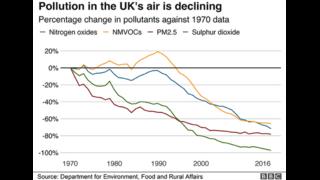
A pollutant called Particulate Matter (PM) is a particular concern with the World Health Organization (WHO) identifying it as the most damaging for people.
Fine particulates, known as PM2.5, are around 200 times smaller than a grain of sand. They are a major health worry as they can penetrate deep into your lungs, pass into your bloodstream and get embedded in your bodily organs and your brain.
The WHO’s models indicate that around 92% of the world’s population live in places where air quality levels exceed their guidelines.
In the UK, more than 40 cities and towns were at, or have exceeded, the WHO limit.
The government has previously said it will reduce by half the number of people living in areas breaching the WHO limits by 2025.
But they now say they will go beyond this and set a “world leading” goal on exposure to PM2.5.
Without giving many details, or a timeline, the government says that by 2030, fine particulate concentrations will be reduced below the WHO safe level “across much of the country”.
The government says it will publish evidence early in 2019 on what actions will be needed to meet this new target.
Ministers argue that Brexit will allow the UK to go much further on this issue than the EU and become the first major economy to adopt air quality goals based on WHO recommendations.
How will the UK reach this ‘bold new goal’?
The most important activity that contributes to particulate pollution is the burning of fuels such as wood and coal in open fires and domestic stoves.
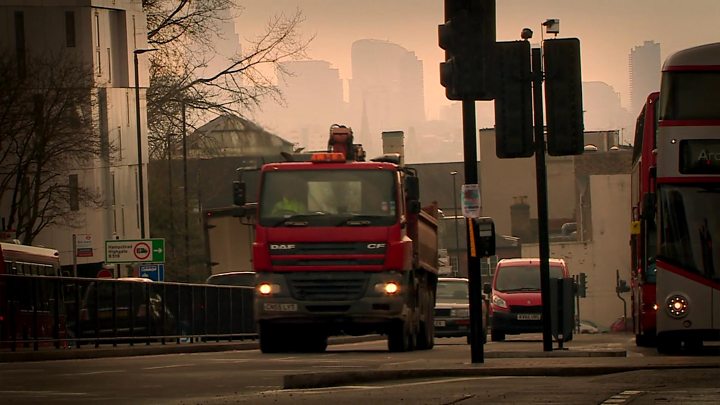
Farming is also a major problem, as emissions of ammonia have increased in recent years. This gas reacts in the atmosphere with other chemicals to produce particulate matter that can be carried on the wind to major population centres.
To deal with domestic burning, the government will ban the sale of the most polluting fuels and ensure that only the cleanest stoves are available for sale by 2022.
They are also consulting on phasing out the sale of traditional house coal and on limiting the sale of wet wood, the type found on garage forecourts. The government’s plan for these fuels is expected within months.
For farmers, the government says it will introduce regulations to require them to use low emission farming techniques. There will be advice, training and support to help them invest in the technology to limit ammonia.
What has been the reaction to this part of the strategy?
The move on particulate matter has been welcomed by the WHO as an “example for the rest of the world to follow”.
Green campaigners also recognise the value of adopting the WHO guidelines but are worried about the lack of legally binding limits.
“The government has made a welcome commitment to set an ambitious new target for cleaning up the most dangerous fine particle air pollution, based on WHO standards,” said Jenny Bates from Friends of the Earth.
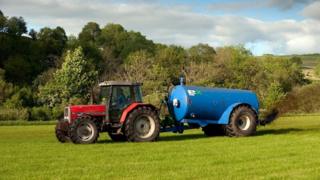 Image copyright Getty Images
Image copyright Getty Images “But while the WHO says standards should be reached by 2030, there is no date set in the government’s strategy and the plan is severely lacking in detail on how such a target could be met.”
Scientists also say the government initiative is laudable but may not work for everyone across the UK.
“The full evidence on reductions needed to attain the tougher WHO guidelines for PM2.5 is to be published later,” said Prof Alastair Lewis from them National Centre for Atmospheric Science at the University of York.
“One would anticipate that there are likely to be some urban areas of the UK where this could be close to impossible to achieve.”
How will this new strategy impact me?
Just a few years ago, garages across the UK reeked of oil and petrol. The smells usually came from the evaporation of fuel vapour, which released volatile organic compounds into the air.
However, regulations to limit the emissions of these powerful air pollutants changed the odour of the UK’s forecourts.
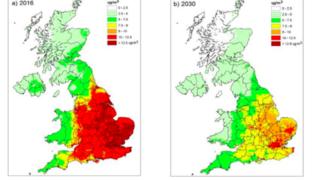 Image copyright DEFRA
Image copyright DEFRA These new government plans may have a similar impact on some current air pollution smells.
If the proposed restrictions on solid fuels go ahead, the smoky whiff of winter over many cities and towns might also disappear.
The government says it will also provide a “personal air quality messaging system” to inform vulnerable members of the public with clear information about the forecast and accessible health advice.
As well as new information, the new plan envisages that everyone will be financially better off if the plan succeeds.
Air pollution is now the fourth biggest public health threat behind cancer, obesity and heart disease.
According to the government, the steps outlined in this plan will cut the costs of dirty air to the UK by £1.7bn every year from 2020, rising to £5.3bn every year from 2030.
What about air pollution near roads?
UK levels of pollution from nitrogen oxides, produced in the main by diesel cars, have regularly exceeded European targets. So much so that the government has been successfully sued in the courts by campaign group Client Earth, to force them to come up with a plan.
In July 2017, the government introduced their detailed scheme for roads, which essentially puts the responsibility in the hands of local authorities. The cities with the worst pollution are supposed to develop plans for clean air zones that will charge drivers to enter.
However, campaigners believe the government has its head in the sand on pollution from transport. As well as clean air zones, they should be taking steps to cut the number of vehicles on the roads.
“They are hoping it will all go away but the reality is an awful lot more needs to be done,” Jenny Bates from Friends of the Earth told BBC News.
“I think they are afraid of the motoring lobby and they shouldn’t be.”
Other forms of transport are dealt with in the new plan including rail and shipping. The government says it wants to see the removal of all diesel-only trains by 2040.
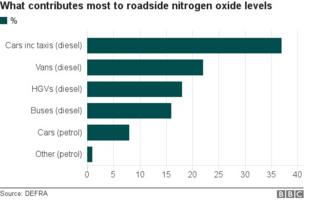
What other air pollution issues will the new strategy deal with?
As well as trying to deal with the major sources of particulate matter, the government’s plan also deals with pollution that arises from ammonia, sulphur dioxide and non-methane volatile organic compounds.
Ammonia from farms is a major focus as outlined above, for the role it plays in the development of PM. However, it also poses major threats to sensitive natural habitats.
“Ammonia in the air over our farmlands dissolves into our wetlands and waterways and wreaks havoc on delicate aquatic ecosystems,” said Hannah Freeman from the Wildfowl and Wetlands Trust.
“The proposed measures are a step forward, but what we really want is government policy that supports farmers to be true stewards, holistically managing our air, soil and water together.”
Read more: https://www.bbc.co.uk/news/science-environment-46823440

